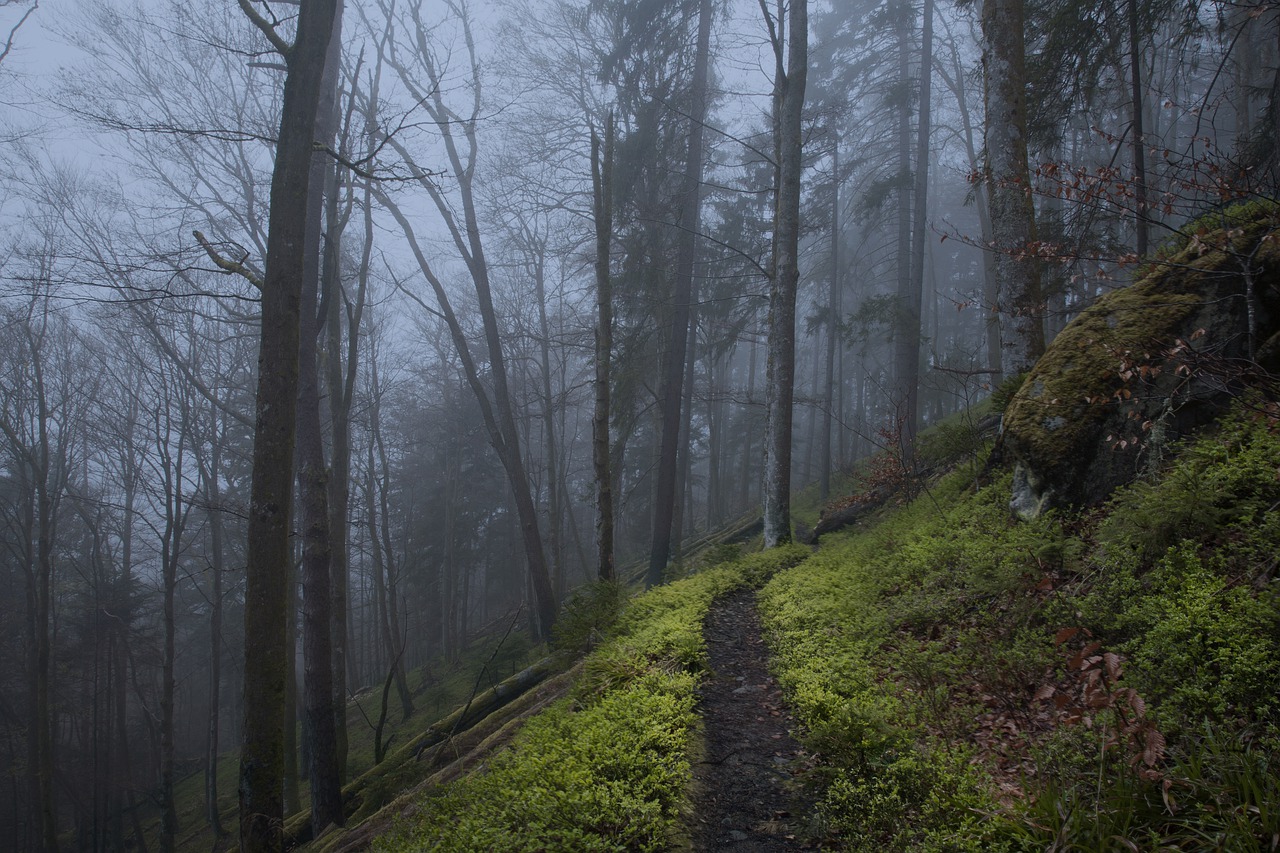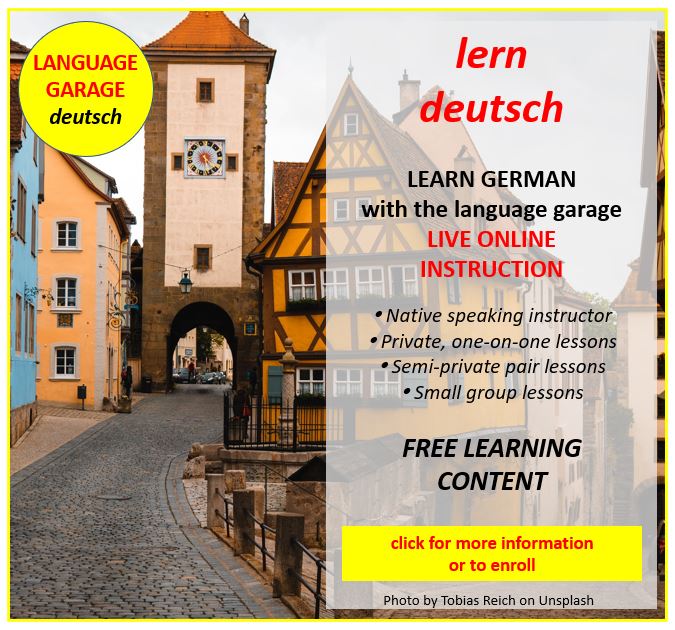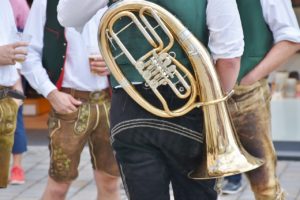Image by Thanks for your recognition • Donations ♡ welcome from Pixabay
In this post we’ll learn some vocabulary and expressions that you can use to talk about the natural world.
Blumen, Bäume, Gras und frische Luft: Flowers, Trees, Grass, and Fresh Air
Let’s start with some basics of nature that you can find around you even if most of the nature you see is in a park: der Baum, -¨e (a tree), die Blume, -n (a flower), der Garten, -¨Ø (a garden), das Gras, -¨er (grass), die Pflanze, -n (a plant), der See, -n (a lake), der Teich, -e (a pond), der Pfad, -e / der Weg, -e (a path), der Wald, -¨er (woods). You’re probably not going to see much wildlife in a park, but if you’d like to know how to talk about the animals you do see, check out this post.
- Im Park gibt es jede Menge Bäume.
There are lots of trees in the park. - Sieh dir die schöne Blume an.
Look at that beautiful flower. - Setzen wir uns ins Gras.
Let’s sit in the grass.
- Setzen wir uns auf die Bank beim Garten.
Let’s sit on the bench next to the garden. - Es führt ein Weg durch den Wald.
There’s a path through the woods. - Lasst uns um den Teich herumlaufen.
Let’s walk around the pond. - Gibt es Fische in diesem See?
Are there fish in this lake? - Ist der See tief oder seicht?
Is the lake shallow or deep?
Bäume und Pflanzen: Trees and Plants
No matter where we are, there’s usually some kind of plant life around us, even if it’s in a pot in the corner of your office: die Zimmerpflanze, -n (houseplant), der Blumentopf, -¨e (flowerpot), die Rose, -n (rose), der Dorn, -en (thorn), die Erde (soil), das Blatt, -¨er (leaf), die Eichel, -n (acorn), der Stiel, -e (stem), der Samen, -Ø / die Saat (seed), die Nuss, -¨e (nut), eine Pflanze gießen (to water a plant), einen Samen pflanzen/ säen (to plant/sow a seed), blühen; Blumen blühen (to bloom; flowers bloom), wachsen; Pflanzen wachsen (to grow; plants grow).
- Ich muss meine Pflanzen gießen.
I need to water my plants. - Wir haben viele Zimmerpflanzen.
We have a lot of houseplants. - Das ist ein schöner Blumentopf.
That’s a beautiful flowerpot. - Die Blätter an der Pflanze da werden braun.
That plant’s leaves are turning brown. - Eicheln fallen von dem Baum.
Acorns are falling from the tree. - Rosen haben Dornen am Stiel.
Roses have thorns on their stems. - Ist der Baum da ein Ahorn oder eine Eiche?
Is that tree a maple or an oak? - Kiefern sind im Winter grün.
Pine trees are green in the winter. - Ich habe im Garten Tomaten gesät.
I planted tomato seeds in the garden. - Die Blumen blühen im Frühling.
The flowers bloom in the spring. - Die Pflanzen in deinem Garten wachsen schnell.
The plants in your garden are growing quickly.
Hügel, Flüsse und Täler: Hills, Rivers, and Valleys
Let’s add some more nature vocabulary: der Hügel, -Ø (hill), das Tal, -¨er (valley), der Fluss, -¨e (river), der Bach, -¨e (stream), der Wasserfall, -¨e (waterfall); das Feld, -er (field), die Wiese, -n (meadow), der Stein, -e (rock), der Fels, -en (boulder), der Sumpf, -¨e (swamp).
- Unser Haus steht auf einem Hügel.
Our house is on a hill. - Wir wohnen an einem Fluss.
We live next to a river. - Der Fluss fließt hier schnell.
The river runs quickly here. - In der Nähe ist ein schöner Wasserfall.
There’s a beautiful waterfall nearby. - Im Tal gibt es viele Bauernhöfe.
There are a lot of farms in the valley. - In der Nähe unseres Hauses fließt ein Bach durch den Wald.
There is a little stream in the woods near our house. - Wir sind über ein Feld gelaufen.
We walked across the field. - Auf der Wiese wachsen schöne Blumen.
There are beautiful flowers growing in the meadow. - Auf dem Hang gibt es jede Menge Steine und Felsen.
There are a lot of rocks and boulders on the hillside. - Diese Straße führt durch einen Sumpf.
This road goes through a swamp.
Berge und Wälder: Mountains and Forests
If you ever get to the mountains, you may need to say: der Berg, -e (a mountain); das Gebirge, -Ø (a mountain range); der (Berg)gipfel, -Ø (the summit of the mountain); in den Bergen wandern (to hike in the mountains); einen Berg besteigen (to climb a mountain); der Gipfel, -Ø (a peak); die Klippe, -n (a cliff); der Wald, -¨er (a forest); im Wald zelten (to camp in the forest); Kiefern / Pinien (pine trees); Ahorne (maple trees); Eichen (oak trees); Birken (birch trees); wilde Tiere (wild animals).
- In diesem Land gibt es zwei Gebirge.
There are two mountain ranges in this country. - Von unserem Fenster aus können wir schöne Berge sehen.
We can see beautiful mountains from our window. - Wie hoch liegt der Gipfel dieses Berges?
How high is the summit of this mountain? - Die Berggipfel sind von Schnee bedeckt.
The mountain peaks are covered in snow. - Wie hoch sind diese Klippen?
How high are those cliffs? - Ich zelte gern im Wald.
I like to camp in the forest. - In diesem Wald wachsen Kiefern/ Ahorne/ Birken/ Eichen.
There are pine trees/ maple trees/ birch trees/ oak trees in this forest. - Gibt es wilde Tiere in diesem Wald?
Are there wild animals in this forest?
Die Welt: The World
Let’s finish with some geographical terms that you can use to talk about the natural world. der Kontinent, -e (continent), der Ozean, -e / das Meer, -e (ocean), die See / das Meer, -e (sea), die Bucht, -en (bay), die Küste, -n (coast), die Insel, -n (island), die Halbinsel, -n (peninsula), die Wüste, -n (desert), der Dschungel, -Ø (jungle), der Gletscher, -Ø (glacier), der Eisberg, -e (iceberg), der Nord/Südpol (north/south pole), der Norden/Süden/Osten/Westen (north/south/east/west). Remember that German uses the nördlich/südlich/östlich/westlich as adverbs or adjectives, and Nord-/Süd-/Ost-/West- in compound nouns, like Nordamerika (North America), die Westküste (the West Coast).
- Wie viele Kontinente gibt es?
How many continents are there? - Der Ozean ist breit und tief.
The ocean is wide and deep. - Ich schwimme sehr gern im Meer.
I love swimming in the sea. - Der Fluss mündet in eine große Bucht.
The river empties into a big bay. - Wir sind die Küste entlang gefahren.
We drove along the coast. - Um auf die Insel zu kommen, muss man eine Fähre nehmen.
You have to take a ferry to get to the island. - Die Wüste ist heiß und trocken.
The desert is hot and dry. - Im Dschungel leben viele verschiedene Pflanzen und Tiere.
Many different plants and animals live in the jungle. - Die Gletscher werden immer kleiner.
The glaciers are getting smaller and smaller. - Am Nord/Südpol gibt es Eisberge im Meer.
There are icebergs in the ocean near the north/south pole. - Die Sonne geht im Osten auf und (geht) im Westen unter.
The sun rises in the east and sets in the west.
Do you want to learn German?
Check out our other posts on German language, culture, and more. And if you’re looking for convenient and affordable live German lessons with a real teacher, check out The Language Garage German. Our lessons are given online in a virtual classroom, so it doesn’t matter where you live or work. We can come to you. And we have flexible options, with a free trial so that you can decide if there’s a fit. Check us out!






